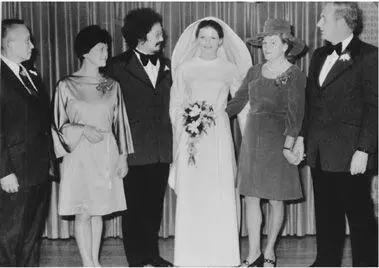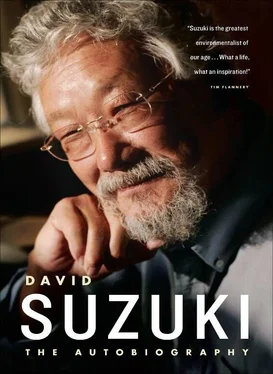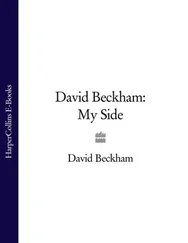But the University of British Columbia, like Berkeley, was swept up in revolutionary fervor and the sexual revolution. Physical appearance didn't seem to matter anymore, and I no longer felt such intense self-loathing because of my small eyes and my Asian appearance. In the pre-aids period before the 1980s, there was rampant experimentation with drugs and sex, and although I was too unhip and insecure to ever try the drug LSD, it was widely believed I was “into” psychedelics and I heard rumors (totally false) that “acid” was being synthesized in my lab.
I was a child of the 1950s, still imbued with the notion of stable relationships and marriage. After Joane and I split up, I had two very serious relationships, one lasting three years and the other close to four years. Both broke up as much as anything because of my own insecurities about whether I was good enough and expectations I had as a spoiled male. I was not ready to commit again to a long-term relationship, and I was still driven by desire to make a name as a scientist.
On December 10, 1971, I was scheduled to give a talk at Carleton University in Ottawa. I entered the lecture room at the top of Carleton Towers to find it packed with several hundred students filling every seat, the aisles, and the floor in front of the podium. As I began to speak, I noticed a sensationally beautiful woman sitting near the front. With long, blonde hair, a full mouth, and high cheekbones, she looked like the American film star Rita Hayworth.
After I gave my speech and answered questions and people began filing out of the room, a handful came down to the front to carry on with a dialogue. The beautiful woman was one of them. I had never acquired the self-confidence to “pick up” someone or even start a conversation in that direction. Instead, as I was leaving, I announced in a loud voice, “I hope you're all coming to the party tonight,” and I left.
I had to sit on a panel early that evening and did not see the beautiful woman in the audience there, so I figured I had failed. Afterward I was driven to the party, which was packed with students, a number of whom immediately surrounded me to engage in serious conversation. About half an hour later, the woman arrived, and I spotted her. I ducked out of the ring of people, popped up in front of her and asked her if she wanted to dance. As I moved away toward the dancing, she looked inquisitively at the woman next to her, who said, “I think he meant you.” So she followed me to the dance floor, and the rest, as they say, is history.
The sensational woman was Tara Cullis, who was working on a master's degree in comparative literature at Carleton. She was twenty-two; I was thirty-five. I learned later she used to watch Suzuki on Science with her boyfriend and had attended my talk out of homesickness for British Columbia. After hearing my lecture, she felt for the first time in her life that she could imagine marrying someone — me.
Later that evening, my good friend Gordin Kaplan, in the Biology Department at the University of Ottawa, invited me to Nate's Restaurant for a snack, and I took Tara along with me. Afterward Gordin drove us to Tara's apartment, where I left her, and she promised to see me in B.C. when she went home for Christmas. I kissed her, and we knew this was pretty special. As I got back into the car, Gordin commented, “She didn't have much to say.” Well, neither had I — Tara and I were both so overwhelmed that we were almost speechless to each other during the meal, but we remember Nate's with great fondness.
How helpful that she was from B.C. Her father, Harry, was superintendent of schools and lived in Squamish, and as soon as I got back to Vancouver, I left a message with her parents that I had called. Soon Tara and I had a date in Vancouver, and we both knew this was serious.
On New Year's Eve, we hiked up Mount Hollyburn in North Vancouver with one of my students, his girlfriend, and another couple, to stay in a cabin there. It was buried under snow, but we dug our way in, got the woodstove going, and soon the room was warm and the table set with food and drink. That night, when we were in our sleeping bags, I asked Tara to marry me. And she did, on December 10, 1972, exactly a year to the day after we had met.
My children have been my pride and joy, but getting Tara to marry me was the greatest achievement of my life, and our marriage continues to be an adventure. Even now, when I come home from a long trip, my heart flutters at the thought of being with her. I had never believed in love at first sight — it was actually lust at first sight — but whatever it was, it was powerful, undeniable, and ongoing.
Tara was always years ahead of her age group in school. She graduated from high school when she was fifteen, but her father kept her there through grade 13 so that she would be a year older when she went to university. She was a top scholar, having been part of the accelerated program in West Vancouver, as well as a champion hurdler and an all-round athlete. And aside from her beauty, she made me feel like a slow learner when it came to discussing literature and history.
When we met, I had told Tara I anticipated her parents would have objections to me because of my race and my age. To my amazement and everlasting respect, neither of those were issues — only my divorce was. They were concerned that I had been divorced and that I had children. But they welcomed me into their home and have been bulwarks in supporting Tara and me in all we have done and in being terrific grandparents. I love and respect them enormously.

Wedding photo of Tara and me, December 10, 1972, with
(left) Dad and Mom and (right) Freddy and Harry
When we were buying the house that is our home today, I had to ask them for help to make a down payment on the mortgage and suggested that when Harry retired, I could add another story to the house and they could come and live with us. We bought the house, added a story to it later, and they moved into their separate apartment with us in 1980, an arrangement that has worked wonderfully for all of us.
Harry loves a good discussion and often provokes arguments by taking a position he may not even believe in, yet I fall for it over and over. As a result, there have been times when I was so mad at him that we were yelling at each other while the women hovered, trying to calm us down. Every human relationship has its ups and downs — there are times when I know Tara is furious at me and times when I'm ticked at my children, but that's the nature of human relations. On the whole, living with Harry and Freddy has been wonderful. They have Tara and their grandchildren right there to visit and fuss over them, and Tara can go upstairs to seek their advice while looking after them now that they are getting older. I am away a lot but can relax because Harry, especially, takes on the care of the house and garden as he has since he moved in.
BEFORE WE MARRIED, TARA said she would keep her maiden name, and I agreed wholeheartedly. She had been called “Cullis” all her life; it was part of her history and persona, and she didn't want to give it up. Today, no one would give it a second thought, but in the early 1970s, many looked on such a decision with disdain. (One annoying consequence of the antiquated, patriarchal practice of adopting another's surname is encountered when searching for a high school friend and discovering she has disappeared, having taken on the identity of Mrs. Harry Smith.) We found out that in Canada, it was illegal for a married woman to keep her maiden name.
We did not go on a proper honeymoon. Because I had been invited to spend a month in the Soviet Union on an exchange program in the summer of 1973, we decided we would wait a few months after marriage and take a long trip. Tara had emigrated from England when she was five and most of her extended family were still there. We planned to stay in England for a month to visit relatives, then travel through continental Europe for another month before flying to the Soviet Union, where an itinerary had been arranged. Next we would fly from Moscow through India, Thailand, and South Korea before spending a month in Japan. We would fly home to Vancouver via Honolulu, completing a four-month round-the-world trip.
Читать дальше



![David Jagusson - Devot & Anal [Hardcore BDSM]](/books/485905/david-jagusson-devot-anal-hardcore-bdsm-thumb.webp)









